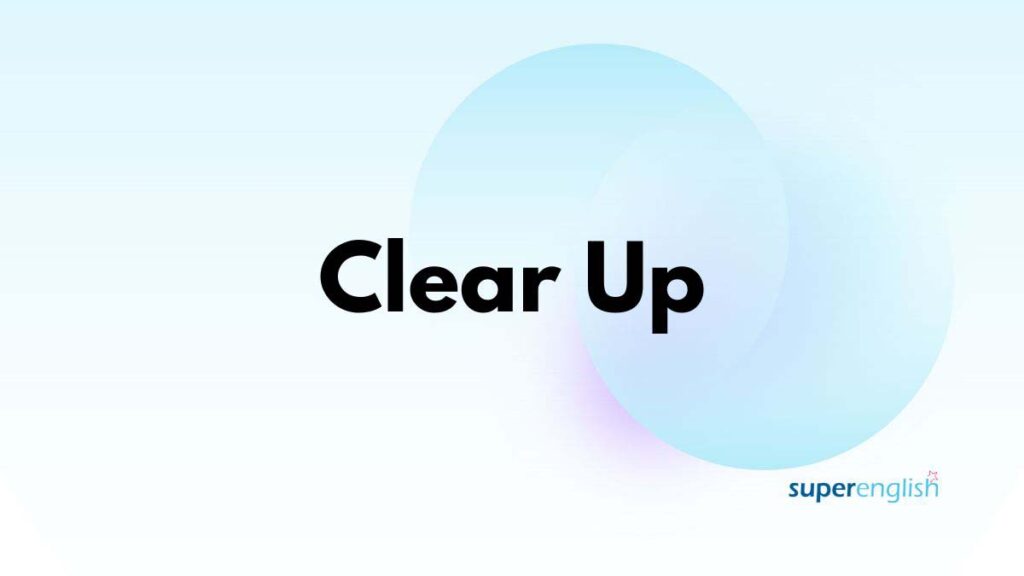
Table of Content
- Definition of Clear Up
- Forms and tenses of Clear Up
- Meaning and usage of Clear Up
- Common expressions with Clear Up
- The list of synonyms for Clear Up
- The list of antonyms for Clear Up
- 50 Example sentences with Clear Up
Definition of “clear up”: provide the exact definition of the phrasal verb “clear up” and how it is used in a sentence
The phrasal verb “clear up” means to resolve or settle an issue or problem. It can also mean to clean or tidy up an area or remove clutter. Here are some example sentences using the phrasal verb “clear up”:
- Can you help me clear up the dishes after dinner? (clean and tidy up)
- The detective was able to clear up the mystery of the missing jewels. (resolve or settle an issue or problem)
- I need to clear up some space in the garage. (clean or tidy up an area or remove clutter)
- The teacher was able to clear up the misunderstanding about the assignment. (resolve or settle an issue or problem)
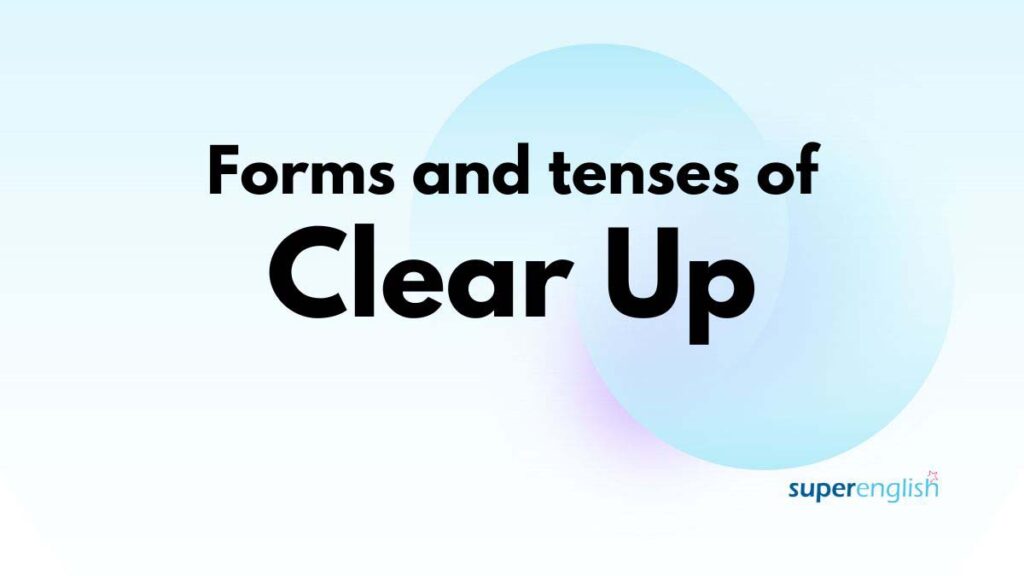
Forms and tenses: the different forms and tenses of “clear up” and examples of how to use each one
The phrasal verb “clear up” is an irregular verb, which means that it does not follow the regular verb conjugation patterns. Here are the different forms and tenses of “clear up” and examples of how to use each one:
- Present simple: I clear up the dishes every night.
- Present continuous: I am clearing up the mess in the living room.
- Past simple: I cleared up the clutter in the garage.
- Past continuous: I was clearing up the clutter in the garage when you called.
- Present perfect: I have cleared up the mess in the kitchen.
- Present perfect continuous: I have been clearing up the clutter in the garage for hours.
- Past perfect: I had cleared up the clutter in the garage before you arrived.
- Past perfect continuous: I had been clearing up the clutter in the garage for hours before you arrived.
- Future simple: I will clear up the mess in the kitchen.
- Future continuous: I will be clearing up the clutter in the garage.
- Future perfect: I will have cleared up the clutter in the garage by the time you get home.
- Future perfect continuous: I will have been clearing up the clutter in the garage for hours by the time you get home.
Note that the phrasal verb “clear up” can also be used in the imperative form, which is used to give orders or commands. For example:
- Clear up the mess in the living room.
- Please clear up the dishes after dinner.
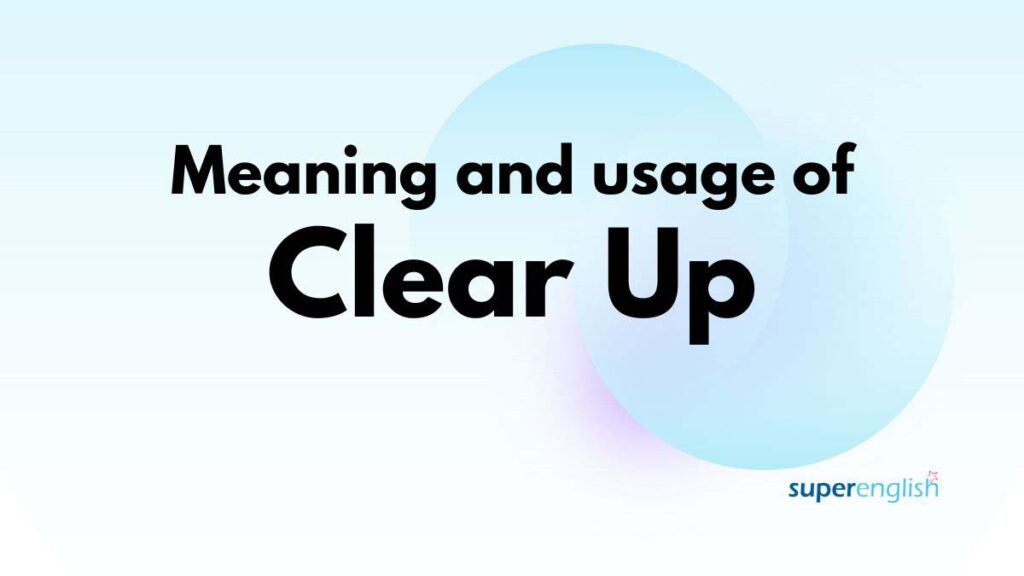
Meaning and usage: the different meanings and uses of “clear up” and examples of how to use it in different contexts
The phrasal verb “clear up” can have several different meanings and uses depending on the context in which it is used. Here are some common meanings and uses of “clear up” and examples of how to use it in different contexts:
- To resolve or settle an issue or problem: The detective was able to clear up the mystery of the missing jewels.
- To explain or make something easier to understand: Can you clear up some of the confusion about the project?
- To clean or tidy up an area or remove clutter: I need to clear up some space in the garage.
- To improve or make something better: The weather forecast says the clouds will clear up by the afternoon.
- To remove or dispose of something: Can you clear up the trash in the backyard?
Here are some more examples of how to use “clear up” in different contexts:
- Medical context: The doctor prescribed some medication to clear up the infection.
- Weather context: The forecast says the clouds should clear up by tomorrow morning.
- Legal context: The lawyer was able to clear up the misunderstanding about the contract.
- Personal context: I’m going to clear up the clutter in my closet this weekend.
- Business context: The company’s financial problems were cleared up with the help of a loan.
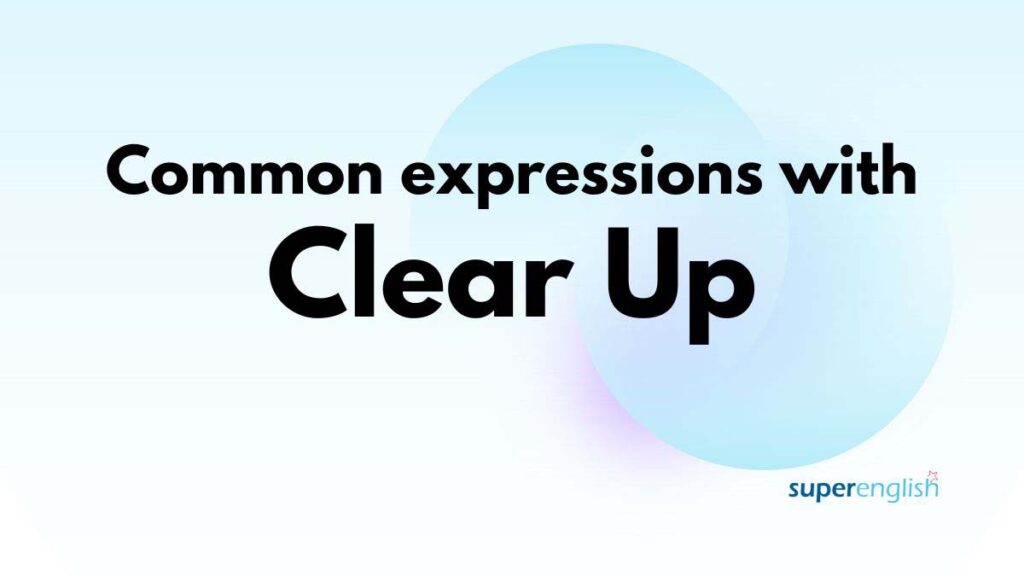
Common expressions with “clear up”: some common expressions that use “clear up” and their meanings and uses
Here are some common expressions that use the phrasal verb “clear up”:
- Clear up the confusion: This expression means to resolve or eliminate confusion or misunderstandings. For example: Can you help me clear up the confusion about the project?
- Clear up the mess: This expression means to tidy up an area or remove clutter. For example: Can you clear up the mess in the living room before the guests arrive?
- Clear up the misunderstanding: This expression means to resolve or eliminate a misunderstanding or confusion. For example: The teacher was able to clear up the misunderstanding about the assignment.
- Clear up the mystery: This expression means to solve or resolve a mystery or puzzle. For example: The detective was able to clear up the mystery of the missing jewels.
- Clear up the issue: This expression means to resolve or settle an issue or problem. For example: The dispute was finally cleared up with the help of a mediator.
- Clear up the controversy: This expression means to resolve or eliminate a controversy or disagreement. For example: The controversy was cleared up when the truth came out.
The list of synonyms for “Clear Up”
These words can be used interchangeably with “clear up” to convey the idea of resolving confusion, providing explanations, or making something easier to understand.
Here is a list of synonyms for “clear up”:
- Resolve
- Settle
- Explain
- Clarify
- Sort out
- Untangle
- Unravel
- Decode
- Decipher
- Disentangle
- Elucidate
- Unscramble
- Demystify
- Illuminate
- Rationalize
- Simplify
- Make sense of
- Enlighten
- Make clear
- Interpret
The list of antonyms for “Clear Up”
These words represent concepts opposite to “clear up” and imply actions or situations that create confusion, make things more complex, or obscure understanding.
Here is a list of antonyms for “clear up”:
- Confuse
- Complicate
- Obscure
- Muddle
- Blur
- Cloud
- Befuddle
- Bewilder
- Mystify
- Complicate
- Puzzle
- Distort
- Confound
- Mislead
- Tangle
- Complicate
- Mix up
- Jumble
- Complicate
- Baffle
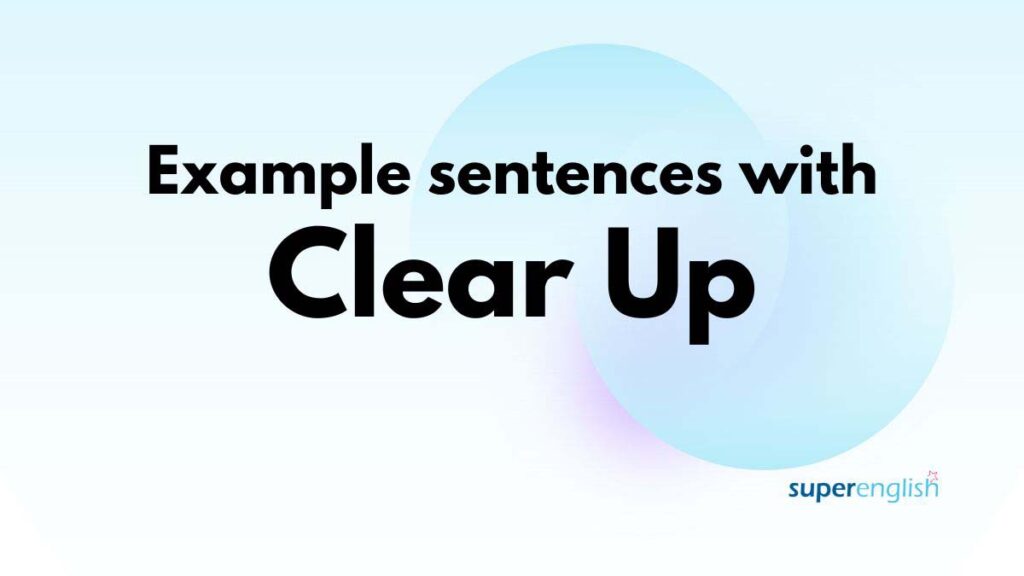
50 example sentences of Clear Up phrasal verb
- I’ll clear up the dishes after dinner.
- Can you clear up the mess in the living room?
- The fog should clear up by late morning.
- I need to clear up some space in the garage.
- The mystery was finally cleared up by the detective.
- Can you clear up some of the confusion about the project?
- The misunderstanding was quickly cleared up by the teacher.
- The company’s financial problems were cleared up with the help of a loan.
- The weather forecast says the clouds will clear up by the afternoon.
- The police are still trying to clear up the details of the accident.
- I’m sorry for the misunderstanding, let me clear it up for you.
- The issue was cleared up after a meeting with the boss.
- The stain on the carpet was finally cleared up with a spot cleaner.
- The government is working to clear up the corruption in the department.
- Can you help me clear up the clutter in the closet?
- The controversy was cleared up when the truth came out.
- The debate was cleared up with a vote.
- The dispute was finally cleared up with the help of a mediator.
- The problem was cleared up after we followed the instructions.
- The mystery was cleared up when the suspect confesses.
- The misunderstanding was cleared up after we spoke on the phone.
- The issue was cleared up after we had a meeting.
- The confusion was cleared up after we reviewed the plans.
- The misunderstanding was cleared up after we clarified the rules.
- The problem was cleared up after we discussed the matter.
- The confusion was cleared up after we explained the situation.
- The issue was cleared up after we presented the evidence.
- The misunderstanding was cleared up after we provided more information.
- The confusion was cleared up after we clarified the expectations.
- The problem was cleared up after we examined the options.
- The misunderstanding was cleared up after we addressed the concerns.
- The confusion was cleared up after we discussed the concerns.
- The issue was cleared up after we explained the process.
- The misunderstanding was cleared up after we outlined the steps.
- The confusion was cleared up after we detailed the instructions.
- The problem was cleared up after we provided more context.
- The misunderstanding was cleared up after we discussed the options.
- The confusion was cleared up after we explained the consequences.
- The issue was cleared up after we discussed the alternatives.
- The misunderstanding was cleared up after we outlined the procedures.
- The confusion was cleared up after we provided more examples.
- The problem was cleared up after we discussed the implications.
- The misunderstanding was cleared up after we presented the solutions.
- The confusion was cleared up after we outlined the benefits.
- The issue was cleared up after we discussed the options in more detail.
- The misunderstanding was cleared up after we explained the rationale.
- The confusion was cleared up after we provided more resources.
- The problem was cleared up after we discussed the consequences in more detail.
- The misunderstanding was cleared up after we presented the pros and cons.
- The confusion was cleared up after we provided more information and resources.
